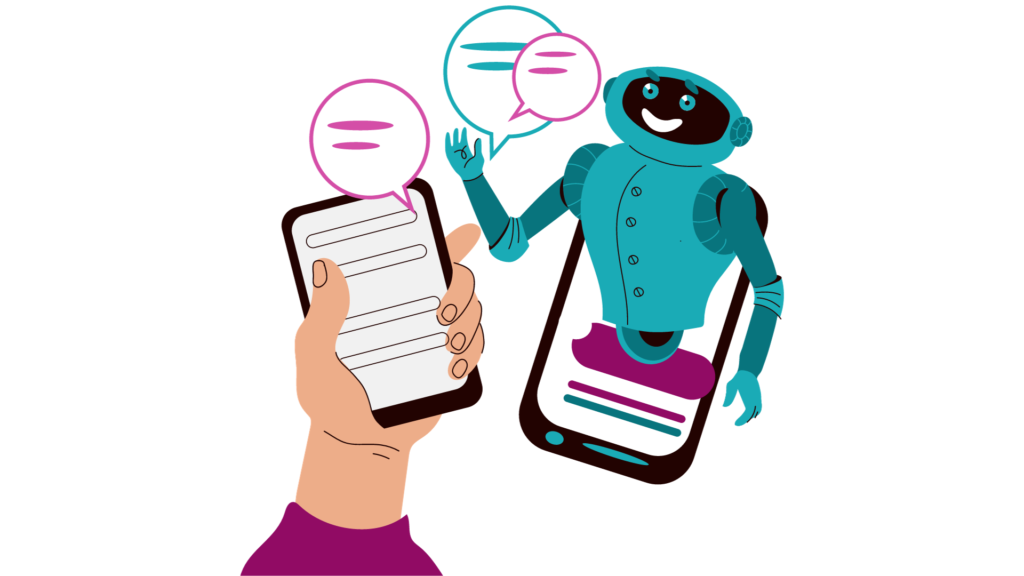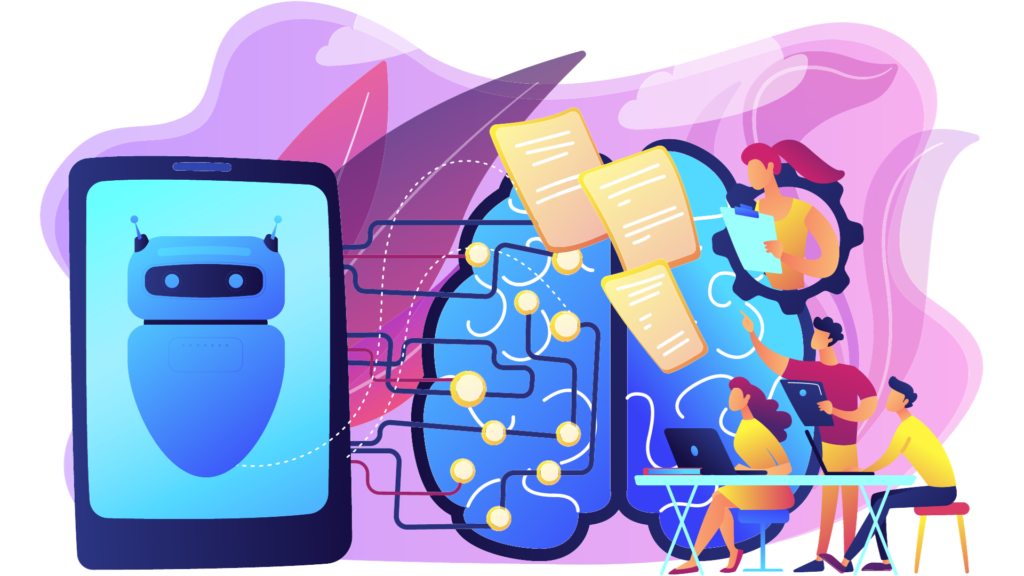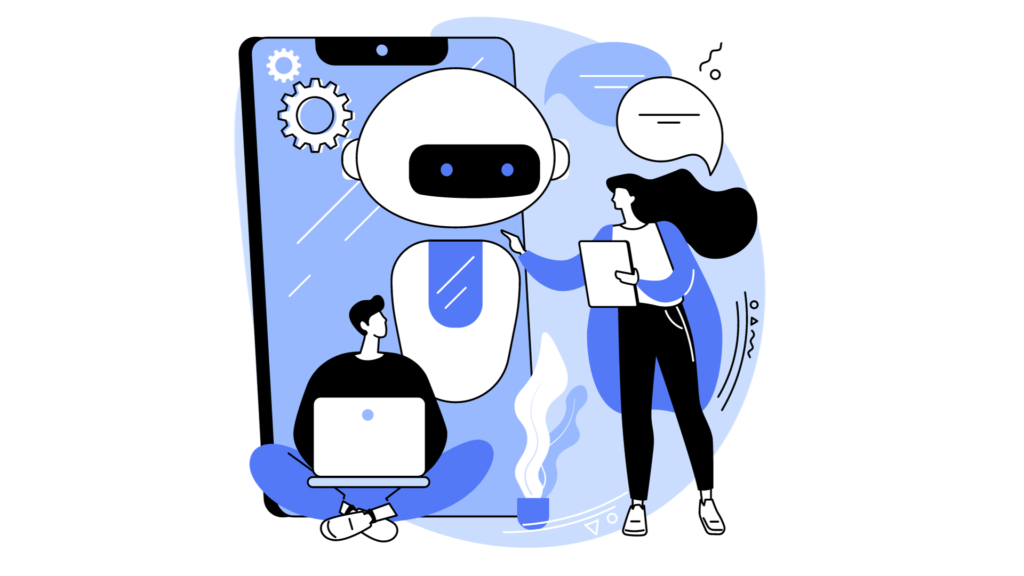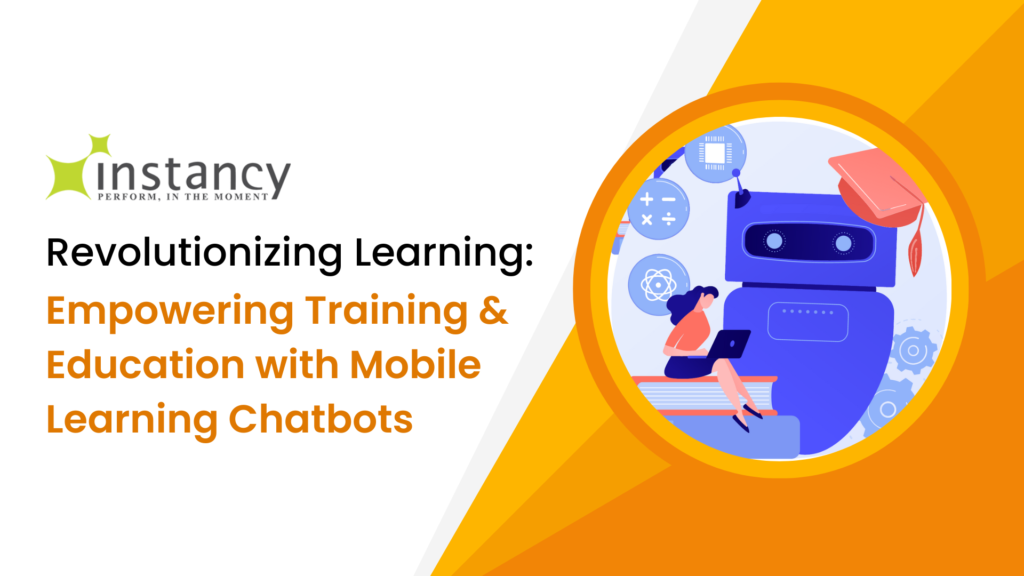Overview
In today’s fast-paced world, where technology is advancing at an unprecedented rate, education has also undergone a significant transformation. One of the revolutionary advancements in education is the emergence of mobile learning chatbots. These intelligent virtual assistants can revolutionize how we learn and train, empowering students, and professionals alike with personalized and interactive learning experiences.
Mobile learning chatbots are software applications that utilize artificial intelligence (AI) and natural language processing (NLP) to provide educational support and guidance through mobile devices. They are designed to simulate human conversation, allowing learners to interact with them conversationally. With their ability to understand and respond to user queries, these chatbots can deliver customized learning content, offer real-time feedback, and facilitate continuous support throughout the learning journey.
The impact of mobile learning chatbots on education is profound. They have the potential to bridge the gap between traditional classroom learning and the demands of the digital age. With the widespread adoption of smartphones and the increasing availability of internet connectivity, these chatbots can reach a vast audience, making education more accessible and convenient for learners of all ages and backgrounds.
Moreover, mobile learning chatbots offer a personalized learning experience, tailoring the content and pace of instruction to meet individual learners’ unique needs and preferences. These chatbots can create personalized learning paths by analyzing user data, such as learning progress and performance and recommending relevant resources and activities to enhance learning outcomes.
Furthermore, these chatbots facilitate interactive and engaging learning. Gone are the days of passive learning, where students are mere recipients of information. With chatbots, learners can actively engage in conversations, ask questions, and receive immediate responses. This interactivity fosters a deeper understanding of the subject and promotes critical thinking and problem-solving skills.
Another key benefit of mobile learning chatbots is continuous support and feedback. Learners no longer must wait for the next class or the availability of an instructor to seek clarification or guidance. Chatbots are available 24/7, offering instant support and feedback whenever needed. This constant availability ensures learners can progress at their own pace without barriers or limitations.
The following sections will explore the various benefits, use cases, implementation strategies, challenges, and the future of mobile learning chatbots in education. So, fasten your seatbelts and embark on a transformative journey to reshape our learning and training. Let’s dive in!
Benefits of Mobile Learning Chatbots

Mobile learning chatbots have revolutionized the education landscape, offering many benefits that enhance the learning experience. From accessibility and convenience to personalized learning and continuous support, these chatbots are transforming how we acquire knowledge. Let’s explore some of the key advantages they bring to the table.
Accessibility and Convenience
One of the primary advantages of mobile learning chatbots is their accessibility and convenience. With the rise of smartphones and tablets, learners can now access educational content anytime, anywhere. Gone are the days when learning was confined to the walls of a classroom or limited to specific timeframes. Mobile learning chatbots break these barriers, allowing learners to engage with educational materials at their own pace and in their preferred environment. Whether it’s during a commute, a lunch break, or even before bedtime, learners can seamlessly tap into a wealth of knowledge and learning resources with just a few clicks.
Personalized Learning Experience
Another remarkable benefit of mobile learning chatbots is their ability to provide a personalized learning experience. These intelligent virtual assistants leverage artificial intelligence algorithms to understand learners’ needs and preferences, tailoring content, and recommendations accordingly. Chatbots can deliver customized learning paths that cater to individual strengths and weaknesses by analysing user data, such as learning patterns and performance. This personalized approach enhances learner engagement and optimizes knowledge retention and skill development. The chatbot adapts and refines its recommendations with each interaction, ensuring learners receive a tailored educational experience.
Interactive and Engaging Learning
Mobile learning chatbots inject a much-needed dose of interactivity and engagement into the learning process. Traditional educational methods often rely on passive consumption of information, which can be monotonous and uninspiring. However, chatbots bring a dynamic element to learning by incorporating interactive features such as quizzes, simulations, and multimedia content. These interactive elements transform the learning journey into an immersive and enjoyable experience, fostering active participation and deep understanding. By gamifying the learning process, chatbots motivate learners to stay engaged, making education a delightful and rewarding endeavour.
Continuous Support and Feedback
Lastly, mobile learning chatbots provide learners with continuous support and feedback, which is crucial for effective learning. Chatbots offer real-time guidance and support, unlike traditional classroom settings where immediate assistance may not always be available. Learners can ask questions, seek clarification, and receive instant feedback on their progress. This constant availability of support empowers learners to overcome challenges and stay motivated throughout their educational journey. Moreover, chatbots can track learners’ performance, identify areas for improvement, and provide personalized feedback to help them reach their learning goals. This ongoing feedback loop ensures learners stay on the right track and progress steadily.
In summary, mobile learning chatbots offer myriad benefits that transform how we learn. The accessibility and convenience they provide enable learners to access educational content anytime, anywhere. The personalized learning experience they deliver caters to individual needs and preferences, optimizing knowledge retention. Chatbots’ interactive and engaging nature injects excitement and motivation into learning. Lastly, the continuous support and feedback they offer to ensure learners receive the e the assistance they need to excel. As the education landscape evolves, mobile learning chatbots emerge as powerful tools that empower learners and revolutionize how we acquire knowledge.
Next, let’s explore some interesting use cases of mobile learning chatbots, from language learning to professional training.
Use Cases of Mobile Learning Chatbots

Mobile learning chatbots have revolutionized how education and training are delivered, offering a wide range of use cases catering to diverse learning needs. These intelligent virtual assistants have the potential to enhance language learning, skill development, exam preparation, and professional training. Let’s delve into each of these areas to explore the immense possibilities mobile learning chatbots offer.
Language Learning
Learning a new language can be daunting, but with the advent of mobile learning chatbots, the process has become more accessible and engaging. These chatbots can provide interactive lessons, vocabulary drills, and pronunciation exercises, all in a conversational manner. Learners can practice their language skills through simulated conversations with the chatbot, receiving instant feedback and corrections. Whether improving fluency, expanding vocabulary, or enhancing grammar skills, language learning chatbots are invaluable for learners of all levels.
Skill Development
Mobile learning chatbots are a game-changer when it comes to skill development. Whether it’s acquiring technical skills or soft skills, these chatbots offer personalized learning experiences tailored to the individual’s needs. By leveraging artificial intelligence and machine learning algorithms, chatbots can assess the learner’s proficiency and provide targeted content and exercises to foster skill development. From coding and design skills to leadership and communication skills, mobile learning chatbots empower individuals to acquire and enhance a wide range of competencies.
Exam Preparation
Preparing for exams can be stressful, but mobile learning chatbots can alleviate some of that pressure by offering comprehensive exam preparation resources. These chatbots can provide practice tests, flashcards, and study materials, helping learners review and reinforce key concepts. Moreover, chatbots can analyze the learner’s performance, identify areas of weakness, and provide personalized study plans to address those gaps. With continuous support and feedback, exam preparation chatbots enable learners to approach exams and achieve better results confidently.
Professional Training
Mobile learning chatbots have transformed the landscape of professional training, enabling organizations to deliver effective and engaging learning experiences. From onboarding new employees to upskilling the existing workforce, chatbots offer a seamless and interactive training environment. They can deliver bite-sized modules, quizzes, and simulations to facilitate learning on-the-go. With the ability to provide real-time feedback and personalized recommendations, chatbots ensure that learners acquire the necessary knowledge and skills to excel in their professional endeavours.
Incorporating mobile learning chatbots into various educational contexts opens possibilities, allowing learners to access education and training anytime, anywhere. These intelligent virtual assistants empower individuals to learn independently, receive personalized support, and engage in interactive learning experiences. As mobile learning chatbots continue to evolve, their impact on education is poised to be transformative.
Stay tuned to learn more about implementing mobile learning chatbots in education and the challenges and considerations associated with their adoption.
Implementing Mobile Learning Chatbots in Education
Several key steps must be taken to successfully implement mobile learning chatbots in education. This section will explore choosing the right chatbot platform, customizing and integrating chatbots, training and monitoring them, and ensuring data privacy and security.
Choosing the Right Chatbot Platform
When choosing the right chatbot platform for educational institutions, several factors must be considered. Flexibility, scalability, and compatibility are crucial aspects that must be considered. Educational institutions should look for a platform that offers a wide range of features and functionalities, such as natural language processing, machine learning algorithms, and advanced analytics. These features enable chatbots to respond accurately, adapt to individual learner needs, and track progress effectively.
Customizing and Integrating Chatbots
Customization is essential to ensure that chatbots align with an educational institution’s specific requirements. Brand consistency, curriculum alignment, and personalization are key factors to consider during the customization process. Educational institutions should be able to tailor the chatbot’s appearance, tone, and content to match their unique brand and educational goals. Furthermore, integrating chatbots with existing Learning Management Systems (LMS) or other educational platforms is crucial for a seamless user experience. This integration allows learners to access chatbots directly within their preferred learning environment, whether an LMS mobile app or an eLearning mobile application.
Training and Monitoring Chatbots
Proper training is essential to ensure that chatbots provide accurate and relevant information. Educational institutions should train chatbots using various learning resources, including educational materials, course content, and FAQs. This training enables chatbots to understand learner queries and provide appropriate responses. Ongoing monitoring is also crucial to identify and address any issues or limitations that may arise. Regular content updates and quality assurance checks help maintain the accuracy and effectiveness of chatbots.
Ensuring Data Privacy and Security
Data privacy and security are paramount when implementing mobile learning chatbots in education. Educational institutions must adhere to privacy regulations, such as the Family Educational Rights and Privacy Act (FERPA) or the General Data Protection Regulation (GDPR), depending on the jurisdiction. It is essential to use secure protocols for data transmission and storage and to anonymize or pseudonymize learner data whenever possible. Regular security audits and encryption measures should be employed to safeguard sensitive information.
Implementing mobile learning chatbots in education requires careful consideration of the right platform, customization and integration, training and monitoring, and data privacy and security measures. By following these steps, educational institutions can harness the power of chatbots to enhance the learning experience and empower learners in an increasingly digital world.
Challenges and Considerations
As with any technology, mobile learning chatbots come with their own set of challenges and considerations. While they offer numerous benefits, it’s important to be aware of potential limitations and address ethical, privacy, and technical concerns to ensure a successful implementation.
Potential Limitations of Mobile Learning Chatbots
While mobile learning chatbots have proven to be effective tools for education and training, a few limitations need to be considered. One potential limitation is the reliance on internet connectivity. As chatbots require an internet connection to function, learners in areas with poor or no internet access may face difficulties in using them. This can hinder the accessibility and reach of mobile learning chatbots, especially in remote or underprivileged areas.
Another limitation is the language barrier. Mobile learning chatbots are typically programmed to communicate in specific languages, which may limit their effectiveness for learners who are not proficient in those languages. It’s essential to consider the linguistic diversity of the target audience and ensure that chatbots are available in multiple languages to cater to a wider range of learners.
Ethical and Privacy Concerns
With the increasing use of technology in education, ethical and privacy concerns have become more prominent. Mobile learning chatbots collect and process user data to personalize the learning experience, which raises questions about data privacy and security. Adopting stringent privacy measures and complying with data protection regulations to safeguard learners’ personal information is crucial.
Additionally, there are ethical considerations regarding the use of chatbots in education. It is important to balance automation and human interaction to ensure that learners receive the necessary guidance and support. While chatbots can provide immediate responses and feedback, human intervention may be required in certain situations to address complex queries or provide emotional support.
Technical Requirements and Support
Implementing mobile learning chatbots requires careful consideration of technical requirements and support. Chatbots must be integrated seamlessly into existing LMS or educational mobile apps to ensure a smooth user experience. Choosing the right chatbot platform that aligns with the organization’s goals and technical infrastructure is crucial.
Furthermore, ongoing technical support is essential to address any issues or glitches that may arise during the implementation and usage of chatbots. Regular monitoring and maintenance are necessary to ensure the chatbots function optimally and provide learners with accurate information. It’s important to have a dedicated team or support system to address technical challenges promptly and assist learners when needed.
In summary, while mobile learning chatbots offer significant benefits in education and training, it is important to be aware of the potential limitations and address ethical, privacy, and technical concerns. By carefully considering these challenges and taking appropriate measures, institutions can leverage the power of mobile learning chatbots to revolutionize education and empower learners worldwide.
Future of Mobile Learning Chatbots

As the field of education continues to evolve, so too do the possibilities for mobile learning chatbots. These intelligent virtual assistants have already significantly impacted how we learn, but the future holds even more exciting advancements and innovations.
Advancements and Innovations
One of the key areas of advancement for mobile learning chatbots is their ability to adapt and personalize the learning experience. With the help of artificial intelligence and machine learning algorithms, chatbots are becoming more adept at understanding individual learning styles and preferences. This means that in the future, chatbots will be able to tailor their content and delivery to meet the needs of each learner better.
Another area of innovation lies in integrating mobile learning chatbots with emerging technologies such as Virtual Reality (VR) and Augmented Reality (AR). Imagine a scenario where learners can engage with a chatbot in a virtual classroom, exploring immersive environments and interacting with virtual objects. This integration of chatbots with VR and AR has the potential to revolutionize how we experience education, making it more interactive, engaging, and memorable.
Integration with Virtual Reality and Augmented Reality
Virtual and augmented reality have already begun transforming various industries, and education is no exception. By combining the power of mobile learning chatbots with these immersive technologies, educators can create highly interactive and realistic learning experiences.
For example, imagine a medical student using a mobile learning chatbot integrated with augmented reality to practice surgical procedures. The chatbot could provide step-by-step guidance and feedback while the student interacts with virtual patients and surgical tools in a simulated environment. This integration enhances the learning experience and provides a safe and controlled space for students to gain practical skills.
Similarly, virtual reality can create virtual classrooms where learners can interact with their chatbot instructor and fellow students more dynamically and engagingly. This integration fosters collaborative learning, problem-solving, and critical thinking skills in a virtual environment that closely mimics real-life scenarios.
Potential Impact on Education
The future of mobile learning chatbots holds immense potential for transforming education as we know it. By leveraging advancements in technology and integrating with emerging trends, chatbots have the power to make learning more accessible, personalized, and engaging.
With the ability to deliver content in bite-sized, interactive formats, chatbots can cater to learners who prefer self-paced and on-the-go learning. This flexibility allows individuals to learn at their own convenience, whether during their daily commute or in the comfort of their homes.
Furthermore, the integration of chatbots with virtual reality and augmented reality opens new possibilities for immersive and experiential learning. Students can explore virtual environments, conduct experiments, and solve complex problems, all within the safe confines of a digital space. This enhances their understanding of the subject matter and fosters creativity, critical thinking, and problem-solving skills.
In summary, the future of mobile learning chatbots is bright and promising. With advancements and innovations in personalization, integration with virtual and augmented reality, and their potential impact on education, chatbots are set to revolutionize how we learn. As educators and learners embrace these technologies, they will undoubtedly pave the way for a new interactive and engaging education era.
Conclusion
In conclusion, the emergence of mobile learning chatbots has revolutionized the field of education, paving the way for a more accessible, personalized, interactive, and engaging learning experience. These intelligent virtual assistants have the potential to transform the way we acquire knowledge and skills, providing continuous support and feedback to learners at their fingertips.
One of the key benefits of mobile learning chatbots is their accessibility and convenience. With smartphones’ ubiquity and the increasing internet connectivity penetration, learners can access educational resources anytime and anywhere. Whether on the bus, during a lunch break, or in the comfort of their own homes, learners can engage with learning materials at their own pace.
Moreover, mobile learning chatbots offer a personalized learning experience. By leveraging artificial intelligence and machine learning algorithms, these chatbots can adapt to learners’ individual needs and preferences. They can provide tailored recommendations, suggest additional resources, and even track progress to ensure learners stay on the right track.
Mobile learning chatbots’ interactive and engaging nature also enhances the learning process. These chatbots can employ gamification techniques like quizzes, challenges, and rewards to make learning more enjoyable and motivating. By incorporating elements of interactivity and entertainment, learners are more likely to stay engaged and retain the knowledge they acquire.
Furthermore, mobile learning chatbots provide continuous support and feedback to learners. They can answer questions, clarify doubts, and provide real-time guidance. Learners no longer rely solely on textbooks or wait for a teacher’s response. Instead, they can receive immediate assistance and feedback, fostering a more independent and self-directed learning experience.
The use cases of mobile learning chatbots are diverse and encompass various domains. From language learning to skill development, exam preparation to professional training, these chatbots can cater to various educational needs. Learners can practice their language skills, acquire new competencies, prepare for exams, and gain industry-specific knowledge, all with the help of a mobile learning chatbot.
Implementing mobile learning chatbots in education requires careful consideration and planning. It involves choosing the right chatbot platform that aligns with the institution’s goals and requirements. Customization and integration are essential to ensure the chatbot seamlessly integrates into the existing educational ecosystem. Training and monitoring chatbots are crucial to optimize their performance and effectiveness. Lastly, data privacy and security must be prioritized to protect learners’ sensitive information.
While mobile learning chatbots offer numerous benefits, there are also challenges and considerations to be aware of. Potential limitations include the inability to replace human interaction and the reliance on internet connectivity fully. Ethical and privacy concerns must be addressed to ensure the responsible use of learner data. Technical requirements and support are essential to ensure a seamless user experience and minimize disruptions.
Looking towards the future, mobile learning chatbots hold immense potential for further advancements and innovations. They could be integrated with emerging technologies such as virtual and augmented reality, providing learners with immersive and interactive learning experiences. The impact on education could be transformative, creating new collaborative and experiential learning opportunities.
In conclusion, mobile learning chatbots have the power to reshape the landscape of education. By leveraging the convenience of mobile devices, personalization of learning, interactivity, and continuous support, these chatbots empower learners to take control of their educational journey. As the field of education continues to evolve, mobile learning chatbots will undoubtedly play a pivotal role in shaping the future of learning.
Instancy offers an innovative mobile learning platform that is transforming corporate training. By providing a seamless, engaging learning experience across devices, Instancy empowers employees to access personalized training content anytime, anywhere. Key features, including offline learning, performance support tools, and social learning, foster continuous skill development and knowledge sharing. Instancy’s mobile learning solutions integrate with an organization’s LMS for efficient training administration and evaluation. As a pioneer in mobile learning technology, Instancy helps companies engage and upskill their workforce to gain a competitive edge. With its learner-centric approach and cutting-edge platform, Instancy enables organizations to create impactful mobile learning ecosystems. To dive deeper, visit https://www.instancy.com/mobile-learning-platform/
Instancy also provides a comprehensive mobile chatbot application to training organizations, enabling learners to converse with a chatbot to get help and assistance throughout their learning journey. The chatbot can answer questions across all types of content or courses within the LMS, and it can also provide personalized learning insights, such as answers to queries about completed courses, previous assessment scores, upcoming assignments, and more. Additionally, the chatbot can be given a voice or avatar personality to personalize the interactions. https://www.instancy.com/chatbot-and-conversational-app/



